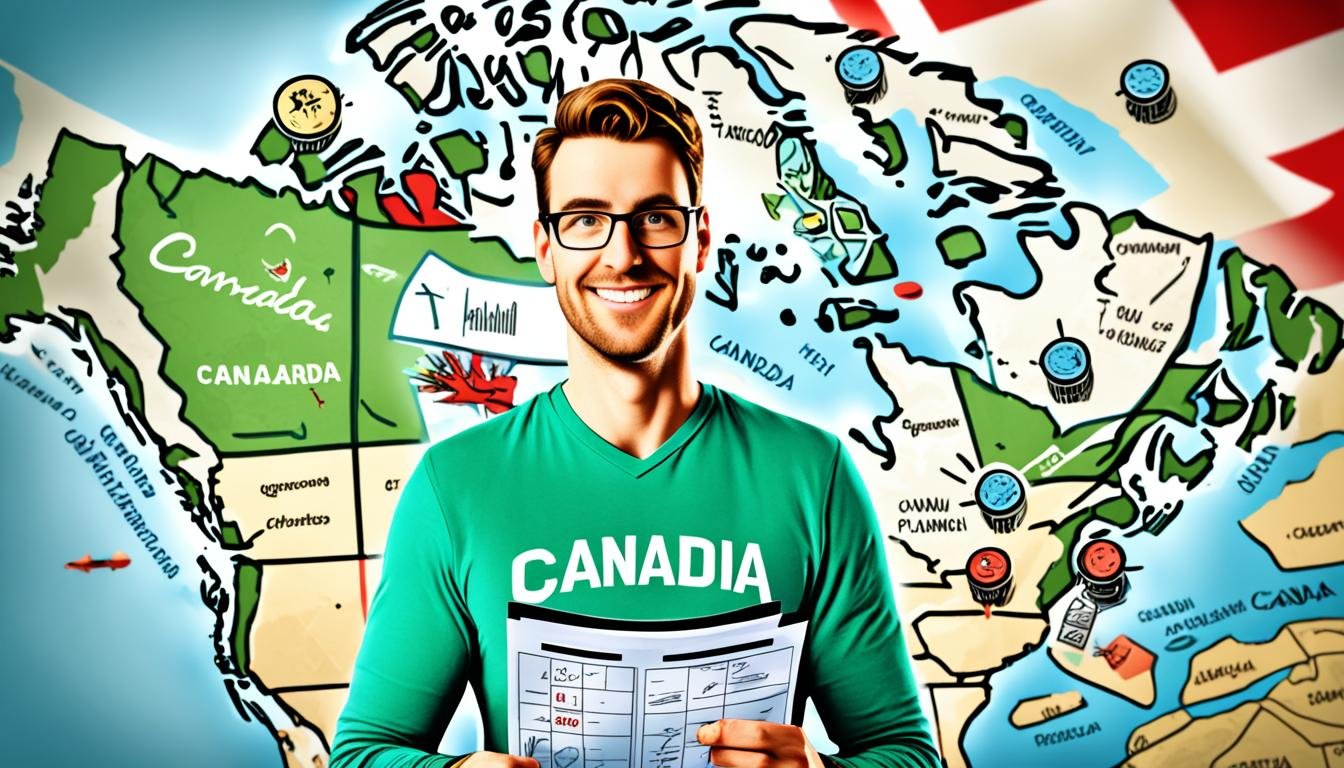How to start a business in Canada
Over 1.17 million small businesses were active in Canada by 2021. Starting a business in such a lively market can feel both thrilling and scary. Luckily, with proper preparation and advice, beginning your business in Canada can be less daunting.
Before you start your business in Canada, you should plan everything carefully. Pick a name for your business and register it with the government. You also need to apply for any needed permits and licenses. Think about where you’ll get support and money for your business. And don’t forget to learn about the taxes you’ll have to pay.
Starting a business might seem hard, but it’s not impossible. Begin by setting a plan and deciding what you’ll offer and to whom. Make sure your business solves a problem and that you’re familiar with the field. Research well, find out who your customers will be, and check out your competitors.
– Learn about the legal structures your business can have in Canada
– Write a detailed business plan to help you get money and steer your startup
– Make sure you have all the licenses and permits you need, from the local to the national level
– Register your new business properly and get a federal business number
– Know what taxes you’ll have to pay, like the GST/HST and income taxes
Evaluate Your Business Idea
Before jumping into starting a business, it’s key to evaluate your idea well. Start by doing market research, determining who your customers are, and checking out the competition. This will help you see if your idea is solid and if it fits the market.
Conduct Market Research
The first step is to do deep market research. Learn everything about your field, current consumer trends, and what challenges and opportunities are out there. Use trusted sources like the Statistics Canada’s Small Business Hub to find important data for your business planning.
Identify Your Target Customers
It’s crucial to know who your target customers are. Understand their needs, what they like, and how they buy things. Once you know your ideal customer, you can design your products or services to fit their needs. This makes your offer more attractive and matches what customers are looking for.
Analyze the Competition
Looking at your competitors is a must. Understand who they are and what they do well or not so well. Also, spot any areas in the market that are not yet addressed. Knowing this will help you find a unique selling point for your business. It aims to make your business strategy stronger and help you stand out.
Choose a Business Structure
When starting a business in Canada, you need to pick a structure. Canada offers three main types: sole proprietorship, partnership, and corporation. Each has its own benefits and drawbacks.
Sole Proprietorship
A sole proprietorship is a simple way to start a business. It’s popular because it merges the business with its owner. This business structures Canada option is straightforward and direct.
Partnership
In a partnership, several people share a business. It’s like a sole proprietorship but with more minds and skills. This partnership Canada setup means more resources and ideas, but it needs more teamwork.
Corporation
Incorporating a business in Canada makes it a separate company. As such, it has its own taxes, debts, and protections for the owners. This corporation Canada model is more complex than the others but comes with big benefits.
| Business Structure | Advantages | Disadvantages |
|---|---|---|
| Sole Proprietorship |
|
|
| Partnership |
|
|
| Corporation |
|
|
Choosing the right business structures Canada is crucial. Look at the benefits and drawbacks carefully to pick the best one for your new business. Your decision will affect many important aspects, so it needs full consideration.
Develop a Business Plan
With the steps you’ve already taken, you’re well on your way to setting up a business. Now, it’s time to write a business plan. This document outlines your vision for the business and how you plan to achieve it. It includes an
executive summary
, a brief version of your
business plan
.
Your business plan should include many things. Such as a
business overview
or company profile, a
marketing and sales strategy
, an
operations plan
and more. This helps you create a road map for your
business
. Also, it provides investors and lenders with the details they need to fund your company.
The executive summary is a quick look at your plan. It sums up your business proposal’s main parts. It should mention your business‘s model, who your audience is, and why it’s special. It also talks about your money predictions and what you need to get started.
The business overview gives more info about your business. It shares your goals, what you stand for, and what you sell. It also says what makes you stand out and how you help your customers.
Your marketing and sales strategy tells how you plan to get and keep customers. It talks about your prices, how you promote, and how you get your products to people. Your strategy shows you know your market and the best ways to connect with them.
The operations plan is about how you’ll do things every day. It talks about making what you sell, how you get it out, and where you work. It also covers the people you need and how you’ll manage them.
The financial projections part is key. It covers what money you expect to make and spend, plus how it flows in and out. Showing this information is important for getting financing and proving your business is a good idea.
| Key Components of a Business Plan | Description |
|---|---|
| Executive Summary | A quick look at your business idea, including your goals, target market, what sets you apart, and money predictions. |
| Business Overview | More about your business, like what you offer, what makes you unique, and the problem you solve. |
| Marketing and Sales Strategy | How you plan to get and keep customers, including your prices and how you let people know about your business. |
| Operations Plan | What’s needed every day to run your business, from how you make what you sell to who does what. |
| Financial Projections | Telling how your business expects to do financially, including money coming in, going out, and a detailed spending plan. |
How to Start a Business in Canada
Before starting a business in Canada, several steps are wise to consider. These include planning your business and choosing a name, registering with the government, and obtaining permits and licenses. Additionally, seek business support and financing. It’s crucial to understand the tax requirements as well. While starting a new business might seem overwhelming, it doesn’t have to be scary. The secret is to create a detailed business plan. This plan should clearly spell out your vision, target market, marketing and sales strategies, operations, and financial goals.
| Step | Description |
|---|---|
| Plan your business | Know what you will offer and who your customers will be. Make sure your business solves a problem and that you’re an expert in the industry. |
| Choose a business structure | Pick from a sole proprietorship, partnership, or corporation. Each has its advantages and drawbacks. |
| Develop a business plan | Make a detailed plan that includes your vision, target market, and how you will market and sell. Also include your operations and financial plans. |
| Register your business | Incorporate your business federally or provincially/territorially, and register with the Canada Revenue Agency. |
| Obtain necessary licenses and permits | Find out what licenses and permits you need at federal, provincial/territorial, and local levels. |
| Choose and register a business name | Pick a unique business name, check for availability, and register it with the government. |
| Understand tax requirements | Sign up for GST/HST and file annual income tax returns. |
| Secure financing | Look into options for financing like small business loans or finding investors to invest in your business. |
| Protect your intellectual property | Protect your business ideas and innovations by registering trademarks, patents, and copyrights. |
By carefully following these steps, aspiring entrepreneurs in Canada can make their business dreams come true. This lays the foundation for achieving long-term success.
Register Your Business
To launch your business in Canada, you must complete a registration process. This involves federal and provincial/territorial steps.
Federal Incorporation
At the federal level, you can work all over Canada. This choice protects your brand widely with a business registration Canada that’s recognized everywhere. To go this route, file documents with Corporations Canada. Then, get a federal business number and a corporation income tax account from the CRA.
Provincial/Territorial Incorporation
Choosing provincial incorporation Canada or territorial incorporation Canada means you can only work in one area. This might suit you better if your business mainly focuses on one region. Once you’ve chosen this path, you must also register your company Canada in any other Canadian areas you plan to work.
The registration process for business registration Canada varies based on your company’s legal structure. Whether you pick a sole proprietorship, partnership, or corporation, it’s wise to get advice. A professional business registration service or a legal advisor can guide you to register accurately and quickly.
Obtain Necessary Licenses and Permits

To start a business in Canada, you need to get several licenses and permits. These are needed at various government levels. What you need can change based on where you are and what your business does. So, it’s vital to look into business licenses Canada, permits for starting a business in Canada, and other regulatory requirements Canada relevant to your venture.
The BizPal tool online is a helpful way to find out what you need. You type in your business’s location and what it’s about. Then, this tool shows you the permits and licenses you must have. By making sure you have everything you need, you can stay out of trouble and set your focus on making your business a success.
| License/Permit Type | Governing Authority | Typical Requirements |
|---|---|---|
| Business License | Municipal Government | Proof of business registration, zoning compliance, and payment of license fees |
| Food Service Permit | Provincial/Territorial Health Department | Compliance with food safety and health regulations, inspection of premises |
| Construction Permit | Municipal Building/Planning Department | Approval of building plans, compliance with construction codes and zoning |
| Environmental Permit | Federal/Provincial/Territorial Environmental Agency | Assessment of environmental impact and compliance with regulations |
Choose and Register a Business Name
Picking the right name for your business is a big first step. It should be catchy but also available for you to use legally. Check that it’s not already taken or too close to another business name or trademark. This takes a thorough search of existing names.
Selecting a Unique Name
Make your business name stand out and be easy to remember. It needs to say something about what you do but be different from other similar businesses. Include key words related to your work. Make sure it’s simple to spell and say.
Searching for Name Availability
When you think of a name, you need to see if it’s free for use. Almost all businesses in Canada must register their name. But if it’s just your name and you use your own bank account, you might not need to. Check if your name is already taken by looking in official databases.
Registering Your Business Name
Once you’re sure the name is free to use, it’s time to register it. How you do this depends on your business setup. For a corporation, whether at the national or the state level, you must incorporate. Other businesses may need to register only with their state or province. This secures your name for your use alone.
Understand Tax Requirements
Starting a business in Canada means you should know about taxes. You need to look at GST/HST registration and income tax rules. These are very important.
GST/HST Registration
If your business makes over $30,000 from taxable sales, you must register for GST/HST. This tax is on many business transactions. You collect it from customers and give it to the Canada Revenue Agency (CRA).
Income Tax Obligations
Besides GST/HST, you might need to pay income tax. After your first year, you must file a tax return. This figure out if you owe any income tax. The tax rules differ by where you are in Canada. It’s smart to get advice from a tax pro.
The Canada Revenue Agency (CRA) helps new business owners understand taxes. Their free service, the Liaison Officer, offers support for small business owners. They help with tax questions and follow the rules.
Secure Financing
Many entrepreneurs start their ventures without outside help, often using their own money. But as their business grows, they might need outside money. This comes in two flavors: debt and equity. When you borrow money that has to be paid back, you’re dealing with debt. This can be a bank loan or a loan from a person.
Equity financing means getting money from investors. They give you the money in exchange for a piece of your business. In Canada, small-business owners can also access grants. These are available for First Nations businesses, new immigrants, and even former military members. Securing the right small business financing in Canada is crucial for your startup’s success.
Small Business Loans
If you’re looking for a type of debt financing, consider a business loan. Banks and credit unions in Canada offer different loan types. You can get a term loan, a line of credit, or even a mortgage for your business property.
To qualify for business loans in Canada, you need a great business plan and solid credit. You also might need to put up something you own as a guarantee.
Government Grants and Support
The Canadian government also helps by offering government grants for startups and other support. These are non-repayable funds that can help your business grow. They’re available for a variety of reasons, like hiring new talent or promoting exports.
It’s a good idea to look into these grants, as different levels of government offer various programs. This might open up extra sources of money for your business.
Investor Funding
If you’re more interested in having people invest in your business, you might look for angel investors or venture capitalists. These are often individuals or companies looking to invest in startups. They hand over money in exchange for a share of your business.
This route can get you more than funds. Investor funding can also bring in valuable advice and connections. But remember, this process can be quite competitive and takes a lot of work.
Intellectual Property Protection
When you start a business, keeping your unique ideas safe is vital. This stops others from copying or wrongly using your work. The Canadian Intellectual Property Office (CIPO) helps with protecting your trademarks, patents, and copyrights. This keeps your valuable intellectual property safe from harm.
Trademarks
Your trademark is your brand’s unique symbol or name. It shows your goods or services are different from your rivals. By registering your trademark in Canada, you stop others from using the same or similar mark. This keeps your brand strong and protects its unique identity.
Patents
Have you made something new and useful? Consider getting a patent. A patent gives you the right to control who can use, sell, or make your invention. This right typically lasts for 20 years. It gives you a head start and protects your new and cool ideas from being taken.
Copyrights
If you create something artistic, written, or digital, copyright law protects it. By registering your copyrights with CIPO, you show it’s yours. This keeps your work safe and stops others from using it without permission.
Learning about the different ways to protect your work in Canada is key. It helps keep your business’s unique ideas and products safe. This way, your company can grow and succeed in the long run without worry.
Conclusion
Starting a business in Canada involves many steps. You need to evaluate your idea and choose a business type. Then, make a full business plan, register your company, and get the required licenses. You also need to understand tax rules, find funding, and protect your ideas. These steps are key for anyone wanting to start a company in Canada.
Launching in Canada might seem hard, but there’s lots of help available. Research your market well and make a solid business plan. Find the right support and finance options. The Canadian government and local groups offer many resources. These help new entrepreneurs through their early steps.
Starting a Canadian business is a big task. But, with the right info and help, it’s doable. Stay informed, look for advice, and get ready well. The support in Canada is great for making new businesses succeed. It helps you tackle obstacles and make your vision a successful reality.
FAQ
What are the key steps to starting a business in Canada?
First, plan what your business will do. Then, pick a good name for it. After that, register your business with the government. Make sure to apply for any needed permits and licenses. Do not forget to look into getting money to start. Also, learn about taxes and how to keep your business’s ideas safe.
How do I conduct market research for my business idea?
Start by figuring out who your customers will be. Look at what other businesses are doing. See how you can offer something special that meets your customers’ needs. You can find good help for this online at places like Statistics Canada’s Small Business Hub.
What are the different business structures available in Canada?
There are three main ways to set up a business in Canada. These are sole proprietorship, partnership, and corporation. Each has its own benefits and things to watch out for when it comes to legal issues, taxes, and who might be responsible if the business has any problems.
What should be included in a business plan?
Your business plan should say what your business is about. It should talk about how you will sell your products and services. It needs to plan out how you will run things and what kind of people you will need to help. And of course, it should look at how you expect your business to do financially in the future.
How do I register my business in Canada?
To get your business registered, you need to follow some steps depending on how you want to set it up. For example, you might need to register with the national government or with a provincial or territorial government. You will also need a business number and some tax accounts from the Canada Revenue Agency. If your business is going to work across more than one place, you’ll need to register in special ways for that too.
What types of permits and licenses do I need to operate my business?
The permits and licenses you need can vary depending on where you are and what you do. BizPal is a useful tool that can tell you what federal, provincial or territorial, and local permits or licenses are needed for your business.
How do I select and register a business name?
Choose a name that no one else is using for their business. You should check if the name you want is already being used. You can do this by searching in different name databases. If your name is not in use, you can then register it for your business.
What are the tax requirements for starting a business in Canada?
If you are selling products or services that need tax and you make more than ,000, you must register for GST/HST. You also need to file your income taxes every year. The tax rules can be complicated, so it is smart to hire a knowledgeable accountant to help out.
What financing options are available for starting a business in Canada?
There are a few ways to get money to start your business. you can look into getting loans or investments from others. The government also offers some grants and support programs for small businesses.
How do I protect my business’s intellectual property?
To protect your business’s ideas, inventions, or brand from being used by others, you can register them. This is done through the Canadian Intellectual Property Office (CIPO). You can get trademarks, patents, or copyrights for your property.







